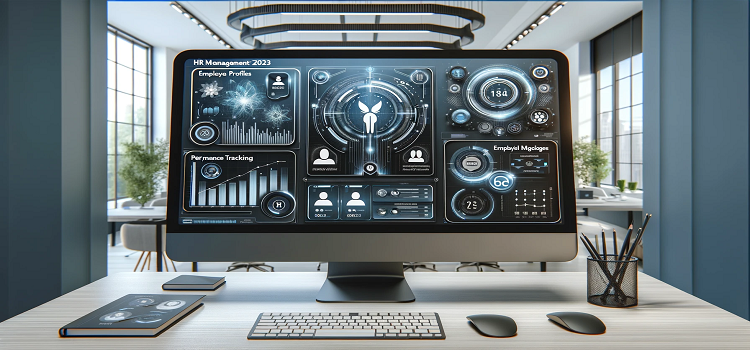Features of The Best HR Management Software

A HR Management Software is an essential tool in the modern business landscape, designed to streamline and optimize the human resource functions of an organization. An effective HRMS is a combination of Software & processes that connect human resource management and information technology. In this comprehensive guide, we’ll explore the key features of an HRMS and how they contribute to effective human resource management.
Features of HR Management Software
Recruitment and Applicant Tracking
One of the primary functions of an HRMS is to facilitate the recruitment process. This includes posting job openings, tracking applications, and managing the recruitment pipeline.
Job Posting and Distribution: Allows for posting job vacancies on various platforms and social media channels.
Applicant Tracking: Tracks the progress of candidates through the recruitment process.
Resume Parsing and Candidate Screening: Automates the screening of resumes to identify the most suitable candidates.
Employee Onboarding
A good HRMS simplifies the onboarding process, ensuring a smooth transition for new hires into the company.
Automated Workflows: Streamlines the onboarding process with automated tasks and checklists.
Document Management: Manages and stores new hire documents electronically.
Orientation Scheduling: Assists in scheduling orientation sessions and training for new employees.
Time and Attendance Management
Tracking time and attendance is vital for payroll processing and compliance. An HRMS typically includes features to manage these effectively.
Time Tracking: Employees can log their working hours, including overtime.
Leave Management: Manages employee leave requests, approvals, and balances.
Attendance Monitoring: Monitors employee attendance and punctuality.
Payroll and Compensation Management
An HRMS often incorporates a payroll system that manages employee compensation, ensuring accuracy and compliance with tax laws.
Payroll Processing: Automates the calculation of wages, deductions, and taxes.
Benefits Administration: Manages employee benefits like health insurance, retirement plans, etc.
Compensation Analysis: Helps analyze and plan employee compensation packages.
Performance Management
Performance management is crucial for employee development and organizational growth.
Performance Appraisals: Facilitates the creation, scheduling, and tracking of employee performance reviews.
Feedback Tools: Provides tools for continuous feedback and performance-related communication.
Goal Setting and Tracking: Allows managers and employees to set, track, and assess performance goals.
Learning and Development
An HRMS supports the continuous learning and development of employees.
Training Management: Manages training sessions, registrations, and attendance.
E-Learning Integration: Integrates with online learning platforms for employee training.
Skill Tracking: Tracks the development of skills and competencies over time.
HR Data Analytics
Data analytics in HRMS provides insights into various aspects of Best HR Management Software.
Reporting Tools: Generates reports on various HR metrics such as turnover rates, hiring costs, etc.
Predictive Analytics: Uses historical data to predict trend analysis HR and inform decision-making.
Employee Sentiment Analysis: Analyzes feedback to gauge employee satisfaction and engagement.
Employee Self-Service Portal
A self-service portal empowers employees to manage their own HR-related tasks.
Personal Information Management: Employees can update their personal information.
Access to Pay Slips and Tax Documents: Employees can access and download their pay slips and tax documents.
Request Management: Allows employees to request leaves, benefits, and other services.
Talent Management
Talent management features help identify and nurture high-potential employees.
Succession Planning: Assists in identifying and preparing potential candidates for future leadership roles.
Career Development Planning: Supports the planning of employee career paths within the organization.
Talent Pool Management: Manages a pool of talented candidates for future job openings.
Compliance Management
Ensures that the organization stays compliant with various employment laws and regulations.
Regulatory Compliance: Helps in adhering to labor laws, tax laws, and other regulatory requirements.
Audit Trails: Provides a record of changes and transactions for auditing and compliance purposes.
Document Expiry Notifications: Alerts HR staff about the expiration of important documents.
Employee Relations
HRMS can include tools to enhance employee relations and workplace culture.
Grievance Handling: Manages employee grievances and complaints.
Employee Surveys: Facilitates the creation and analysis of employee surveys to gather feedback.
Recognition Programs: Manages employee recognition and reward programs.
Workforce Management
Comprehensive workforce management features help in scheduling and deploying Best HR Management Software effectively.
Shift Scheduling: Assists in creating and managing employee work schedules.
Labor Forecasting: Predicts labor requirements based on various business metrics.
Workload Management: Helps in balancing workloads across the team.
Integration Capabilities
An HRMS is often required to integrate with other business systems.
ERP Integration: Integrates with Enterprise Resource Planning systems for a unified business process.
Third-Party Software Integration: Compatible with other software tools like CRM, accounting software, etc.
APIs for Custom Integration: Offers APIs for custom integrations with other business tools.
Mobile Accessibility
With the increasing trend of mobile workforces, HRMS solutions often offer mobile apps or mobile-responsive interfaces.
Mobile App: Offers a mobile app for employees and managers to access HR functions on the go.
Remote Access: Facilitates access to HRMS functions from remote locations.
Security and Data Privacy
Given the sensitivity of HR data, security and privacy are paramount.
Data Encryption: Ensures that data is encrypted and secure.
User Access Controls: Manages user access to protect sensitive information.
Compliance with Data Protection Laws: Ensures compliance with GDPR and other data protection laws.
Conclusion
In conclusion, a Best HR Management Software is an integral part of modern business operations. By automating processes, streamlining workflows, and providing strategic insights, an HRMS can significantly enhance the efficiency and effectiveness of an organization’s HR department. As businesses continue to evolve, the features of HRMS systems will also advance, offering even more robust and integrated solutions for managing the most valuable asset of any company – its people.
Visit: hituponviews









